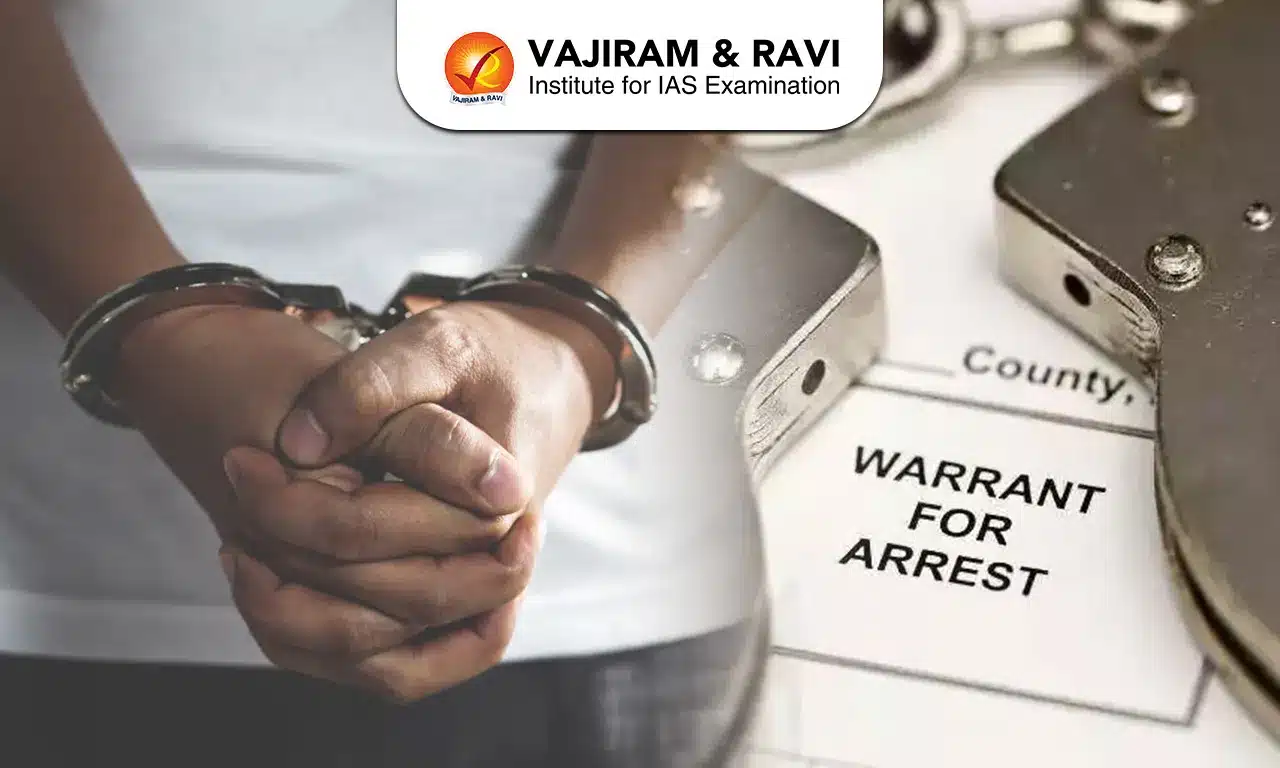Warrant of Arrest Latest News
The Supreme Court recently clarified that when an arrest is made with a warrant, a separate communication of the arrest grounds isn’t required, as the warrant itself serves this purpose.
About Warrant of Arrest
- This is a written order issued by a judge or magistrate, supported by a sworn affidavit, authorizing the arrest and custody of a person accused of committing a specific offense.
- A police officer who executes the warrant shall notify the substance thereof to the person to be arrested and if he demands, shall show him the warrant.
- The officer is also obligated to promptly bring the arrested individual before the court without unnecessary delays.
- Valid Warrant:
- A warrant of arrest should be
- in writing
- signed by the presiding officer of the Court and
- should bear the seal of the Court.
- It should also contain the name of the accused, his address, the offence with which he is charged.
- If any of these factors is absent, the warrant is not in order, and an arrest made in execution of such a warrant is illegal.
- A warrant of arrest should be
- Warrants are of two kinds: Bailable and Non-Bailable.
- A bailable warrant is a Court’s order which contains a direction that if the person arrested executes a bail with sufficient sureties for his attendance before the Court, he may be released from custody.
- In that case it shall further state the number of sureties, the amount of the bond, and the time for attending the Court.
- In case of a non-bailable warrant, the direction for bail will not be endorsed on the warrant.
- Arrest Without Warrant:
- A police officer is empowered to arrest a person without a warrant if there is reasonable suspicion of their involvement in a cognizable offense.
- However, in cases of non-cognizable offenses, a police officer cannot effect an arrest without a warrant issued by a magistrate.
- Cognizable offenses include serious crimes such as murder, rape, robbery, theft, and offenses against the state.
- There are several other situations in which a person can be arrested without a warrant:
- Probable Cause: If a law enforcement officer has probable cause to believe that a crime has been committed and that the person to be arrested committed it, they can make an arrest without a warrant.
- In the Act of Committing a Crime: If an officer witnesses someone committing a crime, they can make an arrest without a warrant.
- Fleeing a Crime Scene: If a person is fleeing from a crime scene and the officer has probable cause to believe they committed the crime, they can be arrested without a warrant.
- Escaping from Custody: If a person has escaped or is attempting to escape from lawful custody, they can be arrested without a warrant.
- Violation of Probation or Parole: If a person is on probation or parole and violates the terms of their release, they can be arrested without a warrant.
- Court Order or Summons Violation: If a person fails to comply with a court order or a summons, they can be arrested without a warrant.
- Threat to Public Safety: If there is an immediate threat to public safety or if delaying the arrest to obtain a warrant would result in the destruction of evidence or the escape of the suspect, an arrest without a warrant may be justified.
Warrant of Arrest FAQs
Q1: What is the meaning of arrest warrant?
Ans: It is a legal document giving permission to arrest someone.
Q2: Who is legally empowered to issue a warrant of arrest in India?
Ans: Judge or Magistrate
Q3: What is essential for a valid warrant of arrest?
Ans: It must be in writing, signed, and bear the court’s seal.
Source: TOI
Last updated on February, 2026
→ UPSC Notification 2026 is now out on the official website at upsconline.nic.in.
→ UPSC IFoS Notification 2026 is now out on the official website at upsconline.nic.in.
→ UPSC Calendar 2026 has been released.
→ UPSC Final Result 2025 is expected to be released in the second week of April 2026.
→ Check out the latest UPSC Syllabus 2026 here.
→ Join Vajiram & Ravi’s Interview Guidance Programme for expert help to crack your final UPSC stage.
→ UPSC Mains Result 2025 is now out.
→ UPSC Prelims 2026 will be conducted on 24th May, 2026 & UPSC Mains 2026 will be conducted on 21st August 2026.
→ The UPSC Selection Process is of 3 stages-Prelims, Mains and Interview.
→ Prepare effectively with Vajiram & Ravi’s UPSC Prelims Test Series 2026 featuring full-length mock tests, detailed solutions, and performance analysis.
→ Enroll in Vajiram & Ravi’s UPSC Mains Test Series 2026 for structured answer writing practice, expert evaluation, and exam-oriented feedback.
→ Join Vajiram & Ravi’s Best UPSC Mentorship Program for personalized guidance, strategy planning, and one-to-one support from experienced mentors.
→ Check UPSC Marksheet 2024 Here.
→ UPSC Toppers List 2024 is released now. Shakti Dubey is UPSC AIR 1 2024 Topper.
→ Also check Best UPSC Coaching in India
Tags: prelims pointers upsc current affairs upsc prelims current affairs warrant of arrest




















